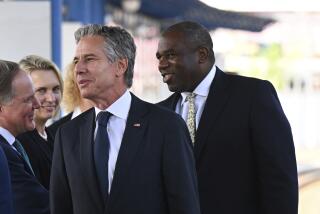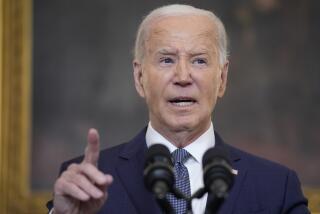U.S. to provide $60 million in aid to Syrian rebels
ROME -- Secretary of State John F. Kerry on Thursday announced the first direct U.S. aid to Syrian opposition fighters, but the more-than-$60-million package will not include the arms or high-tech gear the rebels have long coveted.
Kerry, on his first trip abroad as chief U.S. diplomat, said the United States would supply food rations and medical supplies to the military wing of the opposition and $60 million to its political arm to help provide basic government services in the areas controlled by forces opposed to President Bashar Assad.
Appearing in Rome at an international conference on Syria, Kerry called the new aid a “significant stepping up” of assistance by the United States and promised that, combined with aid from other countries, it would help change Assad’s belief that he can remain in power. As many as 70,000 people have died during the nearly two-year war, according to the United Nations.
Assad “long ago lost his legitimacy ... and must be out of power,” Kerry said.
The Obama administration has been reluctant to supply arms to Syrian opposition forces because of concern that the weapons could end up in the hands of militant Islamist groups.
But Syrian opposition leaders immediately expressed disappointment that Kerry did not move further toward the direct provision of weapons and other military aid to rebel forces.
After Kerry’s comments, Saleh Mubarak, with the opposition Syrian National Council, told Al Jazeera English television that the U.S. package was “good but not good enough.”
Moaz Khatib, head of an umbrella opposition group, did not publicly thank the United States for the new aid and complained that Syria’s foreign supporters were too worried about which fighting groups might have ties to Islamist militants.
“Many sides ... focus [more] on the length of the rebel fighters’ beard than they do on the blood of the children being killed,” Khatib, head of the National Coalition of Syrian Revolutionary and Opposition Forces, said in an appearance with Kerry and Italian Foreign Minister Giulio Terzi.
Kerry has raised expectation for a sharply expanded U.S. role in recent days, saying repeatedly that the United States and its allies would be stepping up aid to convince Assad that he must begin negotiating with the opposition. Some U.S. officials have said the Obama administration was considering providing at least nonlethal gear that is valuable on the front lines, such as body armor and armored vehicles.
But U.S. officials said a long debate over the scope of the U.S. role has continued in recent days, and that the White House, while willing to expand aid, favors a cautious path.
“We’ve been steadily increasing our aid,” an administration official said. “We want to deliver aid in a way that’s well thought through, in a way that’s going to help them.”
A number of senior officials, including former Secretary of State Hillary Rodham Clinton, pressed for the administration to begin providing arms to the rebels. But the idea was rejected by the White House.
The U.S. previously gave $54 million in aid to the political opposition and $385 million in humanitarian assistance to Syrian refugees.
Kerry, pressed about the modesty of the new package, said allies were making other contributions. He suggested that U.S. aid would continue to expand and said the administration planned to press Congress for more money.
“We are doing this, but others are doing other things,” he said.
It is also possible, analysts say, that the United States is funding covert efforts to train or arm the rebels. U.S. officials declined Thursday to discuss reports of such secret activities.
Terzi, appearing with Kerry, said the additional assistance was needed to resolve the intractable and bloody conflict in Syria.
“The suffering of the Syrian people is forcing us to go above and beyond the efforts that have been made up to now. We must be able to reach a turning point,” Terzi said. “Seventy thousand victims are a huge weight on the conscience of the international community. We can no longer allow this massacre to continue.”
Meanwhile, the United Nations and aid groups are issuing ever-more dire warnings about the deteriorating humanitarian situation in Syria and among the multitudes who have fled to other countries.
“The humanitarian situation is dramatic beyond description,” U.N. High Commissioner for Refugees Antonio Guterres said Wednesday. “The refugee crisis is accelerating at a staggering pace, month after month.”
Almost 1 million refugees have fled the country, and more than 2 million other Syrians have been displaced, the U.N. says. About 5,000 more flee Syria each day, the U.N. says, straining the resources of neighboring nations such as Lebanon, Jordan, Turkey and Iraq.
ALSO:
It’s official: Benedict becomes pope emeritus
Venezuelan opposition leader faces fresh charges
In Hong Kong, baby formula feeds discord with mainland Chinese
Chu reported from Rome and Richter from Washington. Times staff writer Patrick J. McDonnell in Beirut contributed to this report.
More to Read
Sign up for Essential California
The most important California stories and recommendations in your inbox every morning.
You may occasionally receive promotional content from the Los Angeles Times.












